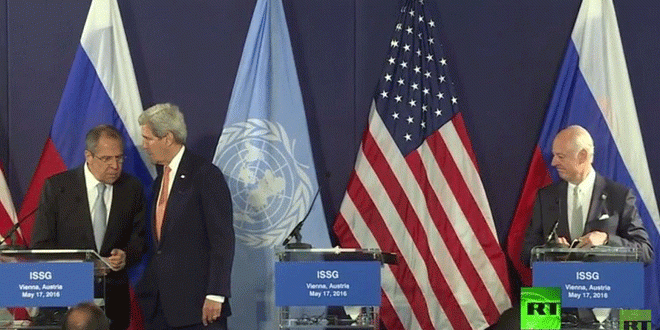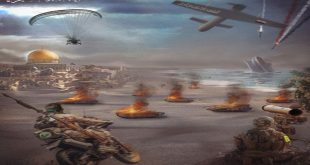Vienna, SANA – The International Syria Support Group asserted that the political solution for the crisis in Syria must be based on preserving the unified Syria which must choose its future within the framework of a “transitional government” that is agreed upon via the Geneva process.
This came in a closing statement following the ISSG meeting held in Vienna on Tuesday, delivered by US State Secretary John Kerry at a joint press conference with Russian Foreign Minister Sergey Lavrov and UN Special Envoy for Syria Staffan de Mistura.
The statement called on the “armed opposition” groups to distance themselves geographically and ideologically from ISIS and Jabhat al-Nusra, stressing the need to increase efforts to emphasize the threat posed by ISIS and al-Nusra.
The ISSG voiced commitment to transforming the cessation of hostilities into a comprehensive truce and using international influence to push all sides to commit to this truce on constant basis, in addition to agreeing to increasing pressure on those who don’t fulfill their obligations regarding the cessation of hostilities.
For his part, Kerry stated that the ISSG has grown since its last meeting to include Japan, Australia, Spain and Canada, which he said shows these countries interest in fighting ISIS and ending the crisis in Syria.
Kerry said that efforts will be made to ensure the delivery of humanitarian aid, with more airlifting of aid, adding that Russia and the US are working together to ensure the implementation of the cessation of hostilities, with communication channels between the two sides working 24 hours to translate words into actions.
He also said that the August 1st date that was referred to as the date for agreeing on a framework for the political process in Syria is a goal, not a deadline.
Lavrov, for his part, said that Russia fully supports fighting terrorism, and in the context of fighting terrorism, the Syrian Arab Army is the most effective and important force on the ground, with the Minister reiterating support for Syria as a UN member and stressing its sovereignty and territorial integrity.
He also said that the most important thing is to stress that the reference of the ISSG’s work is the UN Security Council resolutions on resolving the crisis in Syria, adding that the resolutions adopted today reaffirmed the importance of the agreements reached before, and that what is also important is that the participating sides have unified and joint position on the cessation of hostilities in having it cover the entirety of Syria which would lead to a political process.
The Russian Minister said that progress was made in all fields, with the scale of violence decreasing since the end of February and the delivery of humanitarian aid to besieged areas being facilitated, adding that launching a new round of intra-Syrian dialogue in Geneva will have a positive effect, reiterating that the Syrian Kurds representatives cannot be excluded from the dialogue in Geneva.
He said that two documents have been adopted regarding measures for dealing with breaches of the cessation of hostilities, and that constant work is being carried out on daily basis in this regard at the join center established in Geneva, with Russian and American military figures communicating on daily basis to document breaches and take steps to deal with them.
Lavrov said that Russia and the US, as the co-chairs of the ISSG, are communicating on daily basis to discuss all aspects of resolving the crisis in Syria.
He said that Russia views Jabhat al-Nusra to be a big problem as it forms alliances including ones with groups that joined the cessation of hostilities, stressing that the commitments about separating the “moderate opposition” from Jabhat al-Nusra must be complied with, adding that influence should be practiced on the countries that are still covertly collaborating with Jabhat al-Nusra.
Meanwhile, de Mistura said that setting a date for the new round of talks in Geneva depends on several factors, including the upcoming month of Ramadan, progress in implementing ISSG decisions, and humanitarian aid efforts.
The UN Envoy stressed that the wait for the talks to be held mustn’t take a long time and the momentum for the political process must be preserved, adding that the goal is to have intra-Syrian dialogue produce tangible results, with momentum, the truce, and humanitarian aid being important in ensuring the talks’ success.
The ISSG meeting was held earlier today with the participation of 20 states and organizations.
The meeting discussed means of reestablishing the agreement of cessation of hostilities in Syria and pushing forwards efforts of the political settlement process of the crisis.
Vienna has witnessed several separate meetings between a number of foreign ministers to discuss details of the meeting and the text of the concluding statement.
China’s Special Envoy for Syria Xie Xiaoyan expressed optimism prior to the meeting, expecting advance regarding boosting the cessation of hostilities and broadening the humanitarian access.
He called for being patient as to achieve a sustainable advance of these international efforts for helping solve crisis in Syria.
For his part, German Foreign Minister Frank-Walter Steinmeier told journalists that the meeting aims at finding means of boosting the calm state in all the Syrian territories, delivering assistance and encouraging “opposition” to return to the negotiation table in Geneva.
The ISSG includes Russia, the USA, China, Iran, France, Britain, Germany, Italy, Egypt, Iraq, Jordan, Lebanon, Oman, Qatar, Saudi Arabia, Turkey, UAE, and representatives of the European Union, the Arab League, and the UN, in addition to its new members Japan, Australia, Spain and Canada.
Zarif: Crisis in Syria only solved through political means
For his part, Iranian Foreign Minister Mohammad Javad Zarif said at the end of the meeting that it was very important that those who support terrorists in Syria should know that the crisis in Syria could not be resolved through military means and their support to the terrorists posed threat to all, mainly to themselves.
Zarif added that the Iranian team reiterated during the meeting Iran’s stance which calls for political solutions for the crisis in Syria.
English Bulletin
 Syrian Arab News Agency S A N A
Syrian Arab News Agency S A N A




